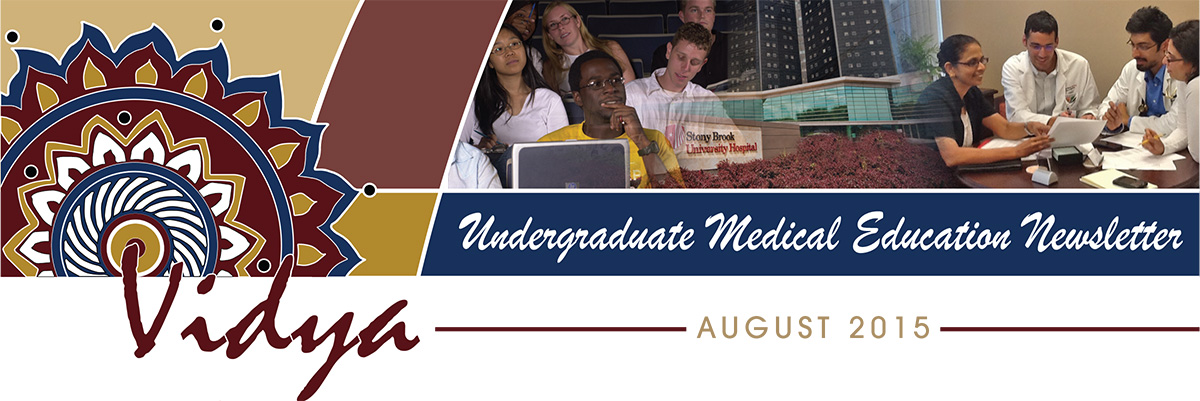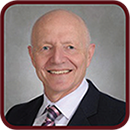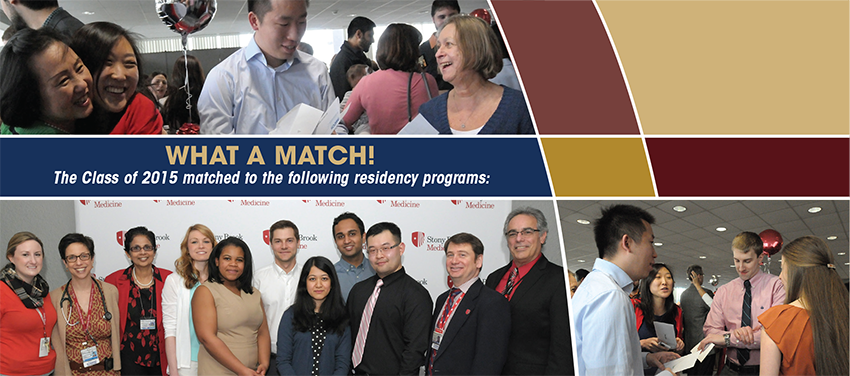| Download PDF Version |
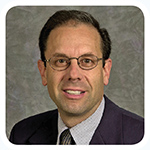 We welcomed the class of 2019 this past week with the second year of our LEARN curriculum. The LEARN Curriculum was the product of an initiative that began over four years ago by a team of over one hundred faculty, students, and administrators at Renaissance School of Medicine at Stony Brook University working in specific subcommittees. Among our goals was our interest in increasing active learning, establishing early professional identity, and developing physician competencies in an integrated and contextual approach. The guiding principles for LEARN approved by our Curriculum Committee included a focus on active student learning, on students having responsibility to learn with faculty serving as facilitators, interdisciplinary integration of curricular content and earlier introduction of the clinical clerkships. The LEARN curricular model was approved by the Curriculum Committee after an eighteen month planning period.
We welcomed the class of 2019 this past week with the second year of our LEARN curriculum. The LEARN Curriculum was the product of an initiative that began over four years ago by a team of over one hundred faculty, students, and administrators at Renaissance School of Medicine at Stony Brook University working in specific subcommittees. Among our goals was our interest in increasing active learning, establishing early professional identity, and developing physician competencies in an integrated and contextual approach. The guiding principles for LEARN approved by our Curriculum Committee included a focus on active student learning, on students having responsibility to learn with faculty serving as facilitators, interdisciplinary integration of curricular content and earlier introduction of the clinical clerkships. The LEARN curricular model was approved by the Curriculum Committee after an eighteen month planning period.
LEARN is an acronym for Learning Centered, Experiential, Adaptive, Rigorous and Novel. The LEARNcurriculum is divided into three Phases: an eighteen month foundational phase, a one year primary clinical phase and a sixteen month advanced clinical phase. Five themes run throughout the three phases of the curriculum.
- patient and family-centered care,
- evidence-based care,
- patient safety and quality care,
- ethical and professional care, and
- health promotion and preventive care.
Several innovative features were incorporated into the LEARN curriculum. These include transition courses at the beginning of each phase of the curriculum, Translational Pillars throughout the clinical phases of the curriculum and the introduction of Stony Brook Teaching Families. The Transition courses provide training as students move from one phase to another. The Transition to Medical School at the start of phase one enables students to begin to understand the roles, responsibilities , expectations, and values of the medical profession. The Transition to Clinical Care course precedes the students’ entry into the clinical clerkships and enables students to learn their roles and responsibilities within the complex world of inter-professional care teams in in-patient and out-patient settings. The Transition to Residency is a course in the fourth year of the curriculum which prepares our students for the skills they will need to begin their internship following graduation. Another innovation in our LEARN curriculum is the implementation of Translational Pillars. Translational Pillars take place at defined intervals throughout the clinical phases. The educational goals of the Translational Pillars are to provide integration along the continuum of basic biomedical sciences to translational sciences to clinical sciences. The topics for the Translational Pillars will cut across all medical specialties and focus on current and emerging topics in the biomedical sciences that will have an impact in the clinical environment. Four Translational Pillars have been developed and will focus on microbial pathogenesis, medical genetics, cancer biology, and metabolic diseases. The Stony Brook Teaching Families are virtual families that have been created by interdisciplinary teams of faculty to assist and enrich the curriculum. These families will visit the students throughout each phase of the curriculum.
Other components of the LEARN curriculum reflect recent and ongoing activities. To assist our students in navigating through the curriculum and to guide their career development, we have instituted a new program this year entitled Pathways to Success whose mission ranges from academic to career advising. Faculty advisors will provide advice, guidance, and mentorship to students. Our Scholarly Concentrations Program is an optional activity in which many of our students participate. Four distinct tracks exist that span the interests of our students and their faculty mentors. These tracks include basic, clinical, translational, or social science research, global health, medical humanities and ethics, and medical education. Students spend at least six months involved in their area of scholarly activity culminating with a presentation of their work through a poster session or oral presentations on Research Day in their fourth year.
Phase one of the LEARN curriculum begins in August of the first academic year and runs through February of the second academic year. It begins with the Transition to Medical School course followed by Biomedical Building Blocks, a six month foundational course comprised of four components, The Body (anatomy), Molecular Foundations of Medicine (biochemistry; cellular biology, and pharmacologic principles), Pathogens and Host Defense (integrating immunology, inflammation, microbiology and immunologic diseases), and Basic Mechanisms of Disease (integrating histology, general pathology, hematologic and neoplastic diseases, and dermatologic diseases). The second part of phase one includes four integrated organ physiology-pathophysiology courses: cardiovascular, pulmonary and renal systems; gastrointestinal system; the endocrine and reproductive system; and a newly created course, Mind, Brain and Behavior (which integrates fundamental neuroanatomy and neurophysiology with neuropathology and psychiatric disorders). Physiology and Pharmacology are integrated throughout Phase one.
Three additional courses run throughout Phase one. Themes in Medical Education are week-long units that bridge key content across the curriculum. These week-long units will have a patient focus within an active learning environment. The two other courses run longitudinally throughout Phase one. Introduction to Clinical Medicine introduces patient-based skills (history and physical exam) and Medicine in Contemporary Society introduces students to ethical and social issues in current health care.
Phase two of the LEARN curriculum is the primary clinical experience and runs for twelve months. This phase includes all of the clinical clerkships. The clerkships are periodically capped by the one-week Translational Pillars.
Phase three is an advanced clinical phase that runs sixteen months. Included in Phase three are sub-internships, clinical electives, the Transition to Residency course, and a specialized Advance Clinical Experience in selected areas of medicine.
We believe that our new LEARN curriculum will provide an enriching and active environment for medical education that will train our medical students to become life-long learners with the knowledge, skills and attitudes to work effectively in complex inter-professional health care teams and activities.

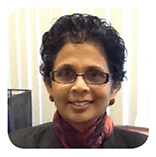
Last year after several years of teamwork and planning we launched an ambitious new curriculum called LEARN. More details of this exciting new curriculum and its principles are in Dr. Fleit’s article in this newsletter. We have created numerous opportunities for our students to expand and enhance their learning avenues. The combined degree programs (MD PhD, MD MBA, MD MPH, MD MA), the Scholarly Concentrations Program in various disciplines, the Global Health Program are some such opportunities. Our students occasionally take an additional year of research training within or outside of Stony Brook and its affiliates: Cold Spring Harbor and Brookhaven National Lab. Their academic performances continue to exceed national means. At the end of the four years, our students match into highly competitive programs and institutions. Over 90% of our graduating students report that they feel satisfied with the overall quality of their educational experience at Stony Brook. And almost 95% of the residency program directors who receive our graduates express happiness in their choice and would re-hire our graduates!
These results occur as a result of dedicated faculty, committed and bright students and diligent organizational learning by the educational leadership. We pay attention to what our students are telling us in safe focus group settings, how they experience our curricular innovations, and how our programs are rated compared to national benchmarks. In fact, our educational quality improvement process was highlighted in a recent publication by the Association of American Medical Colleges, and our paper on this topic has been accepted for publication in the journal Academic Medicine. We are continually learning and evolving to improve our educational programs.
Our students are also very engaged in the local communities. They volunteer at the free medical clinic for the disadvantaged populations in Suffolk County, teach at local community fairs, and in local public schools on topics such as obesity, wellness, nutrition, sexually transmitted diseases, and medical careers. They put together amazing shows such as the Evening of the Arts and Asian Extravaganza, among others. They have fun and work hard and do make a significant impact in the local community around us. We are fortunate to have a good team of students who volunteer to help with various aspects of the curriculum, and with their earnest input we anticipate to further strengthen our MD program. Thank you!!
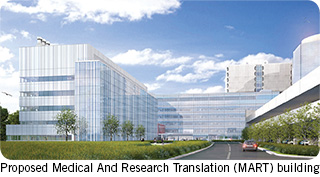 A quick note on some exciting things on the horizon: A brand new 240,000 square foot eight level building called Medical And Research Translation (MART) building is currently under construction with anticipated occupancy in 2016. There will be a large 300 person auditorium and plenty of educational space. We are ready to kick off our new “Pathways to Success” program which includes early advising pods and detailed career planning activities. Read more on that in Dr. Iuli’s report in this newsletter. Our first “Translation Pillar” blending basic sciences with clinical sciences will be experienced by the Phase II LEARN students within the next year. We are in the process of putting some final touches on a few new interesting selectives to be offered in Phase III of the LEARN curriculum. The topics will include such innovative areas as gender based medicine, palliative care, and the business of medicine: quality and value. We will also have an exciting interprofessional geriatric clinical experience offered as a selective. And lastly, technology — our students receive experiential learning using ultrasounds in the clinical setting at the patient bedside — something they can easily translate into their own future clinical practices. We are considering implementing more mobile devices for students in educational settings to experience just in time learning, especially in the clinical setting. So in a nutshell, we have made a lot of changes, monitored plenty of data and student input and are happy to see significant progress in all areas. We continue to challenge ourselves to be even better!
A quick note on some exciting things on the horizon: A brand new 240,000 square foot eight level building called Medical And Research Translation (MART) building is currently under construction with anticipated occupancy in 2016. There will be a large 300 person auditorium and plenty of educational space. We are ready to kick off our new “Pathways to Success” program which includes early advising pods and detailed career planning activities. Read more on that in Dr. Iuli’s report in this newsletter. Our first “Translation Pillar” blending basic sciences with clinical sciences will be experienced by the Phase II LEARN students within the next year. We are in the process of putting some final touches on a few new interesting selectives to be offered in Phase III of the LEARN curriculum. The topics will include such innovative areas as gender based medicine, palliative care, and the business of medicine: quality and value. We will also have an exciting interprofessional geriatric clinical experience offered as a selective. And lastly, technology — our students receive experiential learning using ultrasounds in the clinical setting at the patient bedside — something they can easily translate into their own future clinical practices. We are considering implementing more mobile devices for students in educational settings to experience just in time learning, especially in the clinical setting. So in a nutshell, we have made a lot of changes, monitored plenty of data and student input and are happy to see significant progress in all areas. We continue to challenge ourselves to be even better!

Achieving operational excellence in undergraduate medical education (UGME) programs requires promoting a culture of continuous quality improvement (CQI). Here at Renaissance School of Medicine, in addition to the various ways we have in place to collect feedback on student learning experiences (e.g. end of course surveys, focus groups, etc.), we also generated mechanisms to collect, monitor, and review relevant data as part of our program evaluation process to assess the impact and effectiveness of our innovative curricular endeavors. An example is our Student Tracer program where twenty first-year medical students from the Class of 2018 were recruited through a competitive application process at the beginning of Phase I and are expected to participate in all four years of their medical school training. Student tracers are asked on a regular basis to provide the school with constructive and timely feedback on the integration of two longitudinal components of our revised LEARN curriculum: Themes in Medical Education (TiME) and the Stony Brook Teaching Families (SBTF). All of our required courses have standard methods for collecting end of course evaluations, however since TiME and SBTF are longitudinal that run across all four years of the LEARN curriculum, gathering just-in-time feedback is a challenge. Based on their learning experience and that of their peers, each pair of student tracers for each theme or teaching family serves as the school’s “eyes and ears” by submitting written feedback via an ePortfolio system to faculty leaders of their theme or teaching family regarding the strengths, areas in need of improvement, and missed opportunities of activities participated to date in the curriculum. Every six months, student tracers will meet face-to-face with the faculty leaders to go over the feedback submitted and brainstorm ideas for future changes. Subsequently, the faculty leaders and course directors meet to discuss plans of action for the following academic year that include ideas and suggestions from the student tracers.
Additionally, we implemented a Course Quality Improvement (Course-QI) program to promote reflective practice and teaching of our faculty. At the conclusion of every course or longitudinal component in the Phase I LEARN curriculum, based on faculty experiences and student evaluation, the course directors will review and prepare an end of course report that includes plans for changes to the course for the following academic year. These reports are presented and discussed at the Learner Assessment and Curriculum Evaluation (LACE) committee meetings one-two months after the end of the course. Course directors are given the opportunity to summarize and share thoughts about significant accomplishments, challenges encounter, issues that need to be addressed by administration and plans for changes to the course in its next iteration..
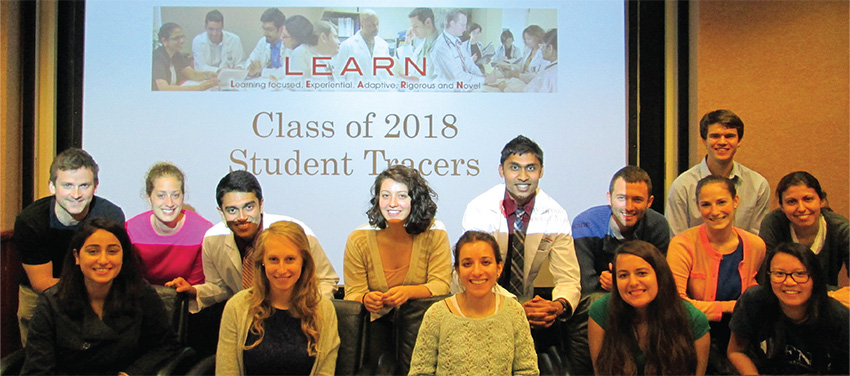
| Theme | Student Tracers – Class of 2018 | |
| Evidence-Based Care | Shawn Jindal | Nicole Golbari |
| Patient and Family Centered Care | Luisa Sperry | Samita Mohanasundaram |
| Health Promotion and Preventive Care | Alexandria Imperato | Olivia Cheng |
| Ethical and Professional Care | Brittany Rush | Arjun Anilkumar |
| Patient Safety and Quality Care | Stephen Meigher | David Restle |
| Stony Brook Teaching Family | Student Tracers – Class of 2018 | |
| Santiago Family | Saumya Bhutani | Tzvia Pinkhasov |
| Tallock Family | Michael Nevid | Naomi Friedman |
| Olander Family | Matthew Brandorf | Grace Perrotta |
| Nicholls Family | Connor McElligott | Danielle Gladstone |
| Yelamos Family | Lisa Bevilacqua | Joseph Gross |
The Scholarly Concentrations Program (SCP)
The Scholarly Concentrations Program is a four-year track opportunity for medical students to engage in and attain recognition for scholarly pursuits in related areas of medicine. Under this Program, students have the opportunity to do academic exploration in Basic, Translational, Clinical and Social Sciences Research, Global Health, Medical Education, or Medical Humanities and Ethics. The program aims to align the areas of interest of students with the academic mission of the School providing a longitudinal area of work to the student experience at Renaissance School of Medicine. For many students, this period has been extremely helpful in shaping career goals and in building an academic track record attractive to residencies. The specific goals of the Scholarly Concentrations Program are:
- To provide encouragement, impetus, and support for engaging in additional extracurricular scholarly pursuits aligned with one’s own area of interest
- To facilitate the attainment of valuable career experience in areas and projects related to medicine as a complement to students’ didactic medical education.
- To provide special recognition to students who engage in such scholarly pursuits and meet the standard requirements of the program.
A Research Day is held every year in the spring to give graduating students an opportunity to present the results of their research in an oral and/or poster presentation. A research award is given to an outstanding student chosen by the SCP committee as part of the graduation festivities. You can learn more about this program online at: http://medicine.stonybrookmedicine.edu/firstyearresources/mdscholar
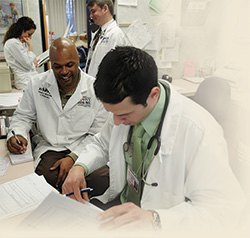
Mission Statement: Stony Brook HOME is dedicated to improving the health and well-being of the underserved community in Suffolk County by:
- increasing access to free, dependable, and comprehensive health services
- empowering individuals and families through education and social services
- training future clinicians in culturally competent and
compassionate care
Benefits of volunteering at SB HOME for medical students includes:
- giving back to the local community
- early clinical exposure
- interacting with upperclassmen
- learning clinical skills early
- working directly alongside attendings
- learning how to run a clinic
- satisfaction of helping those in need
For more information about participating in SB Home, please visit:
http://www.stonybrookhome.com/for-volunteers/preclinical-student-responsibilities-1

Undergraduate Medical Education Deans | |
Latha Chandran, M.D., M.P.H.
| |
Grace Agnetti, M.S. Ed
| |
Mary Jean Allen
| |
Howard B. Fleit, Ph.D.
| |
Jack Fuhrer, M.D.
| |
Aldustus E. Jordan III, Ed.D.
| |
Andrew Wackett, M.D.
|
Richard J. (Rick) Iuli, Ph.D.
| |
Wei-Hsin Lu, Ph.D.
| |
Caroline R. Lazzaruolo
| |
Doreen Olvet, Ph.D.
| |
Nancy Acevedo, Office of Admissions
| |
Bonnie Chalson, Office of UGME
| |
Ann Dowsey, Office of UGME
|
Donna Kaufman, Office of UGME
| |
Rhonda Kearns, Office of UGME
| |
Maria Heifferon, Office of Admissions
| |
Fabiola Moraes-Narvaez, Office of Admissions
| |
Diane Piscitelli, Office of Student Affairs
| |
Lorraine Reeve, Office of UGME
| |
Dianne Tokar, Office of UGME
|

WELCOME — CLASS ENTERING 2015
The Committee on Admissions is proud to introduce the 2015 entering class! The Admissions Office received 5,255 applications and 714 applicants were interviewed by members of our Committee on Admissions. We made 394 offers to fill our increased class size of 132. This year, we have more out of state (34) and international students (7) than ever before. The male to female ratio is nearing parity (51.5% Male, 48.5% Female). The number of students with advanced degrees is higher than ever before with 21 in total, including 1 PhD and 1 Doctor of Pharmacy. Although MCAT scores have remained rock stable at 32 total, the science GPA has increased to 3.70. Students majored in many fields of study, 80% in the sciences. They also attended 70 different schools (listed below) and include many of the finest universities in this country.
Cornell University 8
SUNY Binghamton 8
Fordham University 4
Johns Hopkins University 4
University of California-Berkeley 4
University of California-San Diego 4
University of Pennsylvania 4
McGill University 3
University of California-Los Angeles 3
Yale University 3
Hamilton College 2
Hofstra University 2
New York University 2
SUNY College at New Paltz 2
University of Maryland 2
University of Rochester 2
University of Southern California 2
University of Virginia 2
Washington University 2
Wellesley College 2
The following schools have one acceptance:
American University, Amherst College, Bryn Mawr College, Carleton College, Carnegie Mellon University, CUNY Brooklyn College, CUNY City College, CUNY Lehman College, CUNY Queens College, CUNY York College, Colgate University, College of the Holy Cross, Columbia University, Dartmouth College, Duke University, Georgia State University, Interdisciplinary Center College (Israel), Harvard University, Macalester College, Massachusetts Institute of Technology, McMaster University, Middlebury College, Montana State University, Pomona College, Princeton University, Rensselaer Polytechnic Institute, Rutgers University, San Francisco State University, SUNY Albany, SUNY Buffalo, SUNY College at Cortland, SUNY College at Plattsburgh, Syracuse University, University of Texas at Dallas, Touro College, Tufts University, Tulane University, University of California-Santa Barbara, University of Chicago, University of Cincinnati, University of Connecticut, University of Guelph, University of Pittsburgh, University of Toronto, University of Western Ontario, Wesleyan University, Wheaton College, Yeshiva University
TOTAL SCHOOLS REPRESENTED: 70
We all look forward to welcoming the 2015 entering class to Stony Brook and wish everyone all the best in medical school.
Sincerely,
Jack Fuhrer, MD
Associate Dean for Admissions
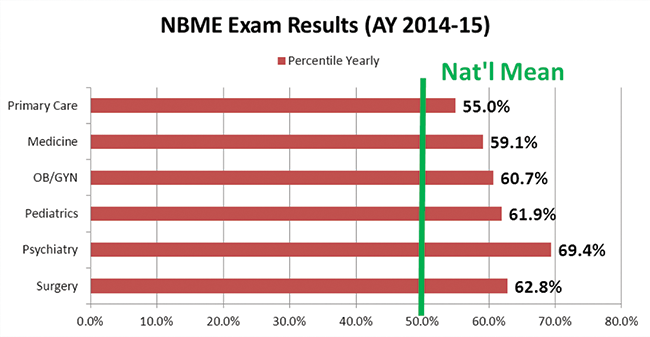
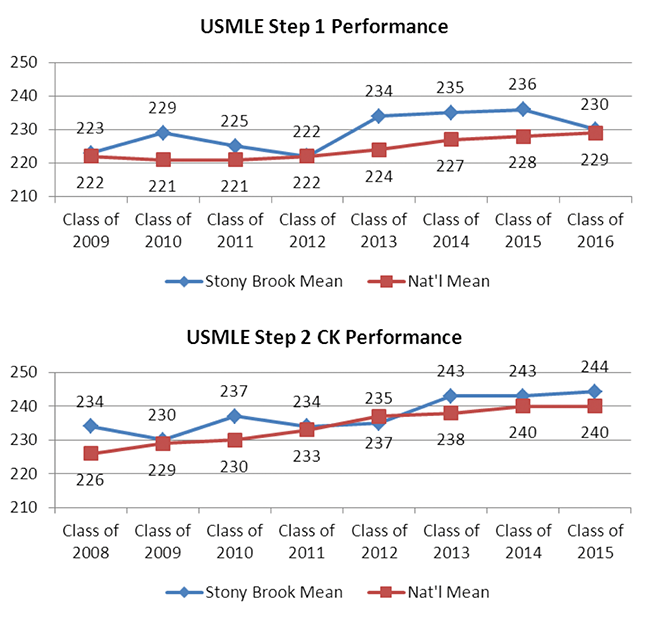
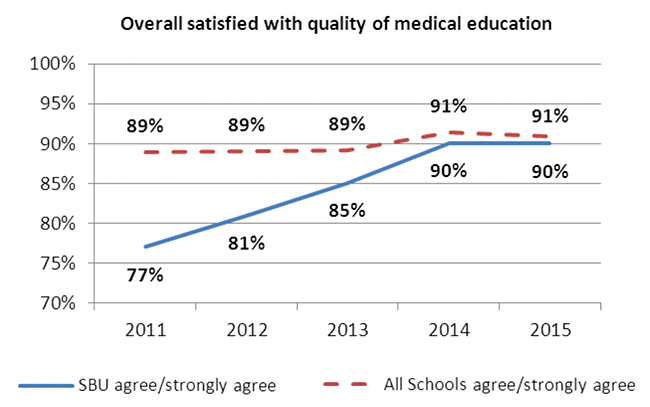
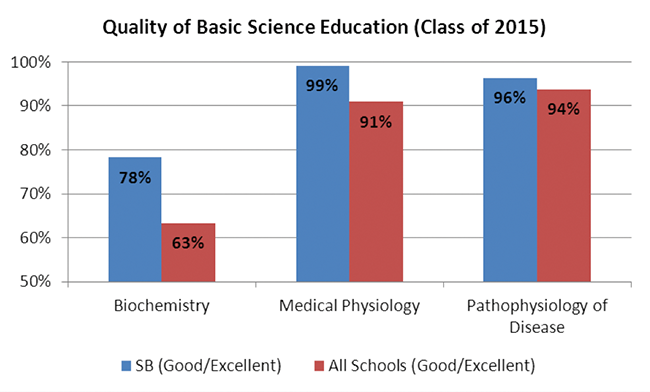
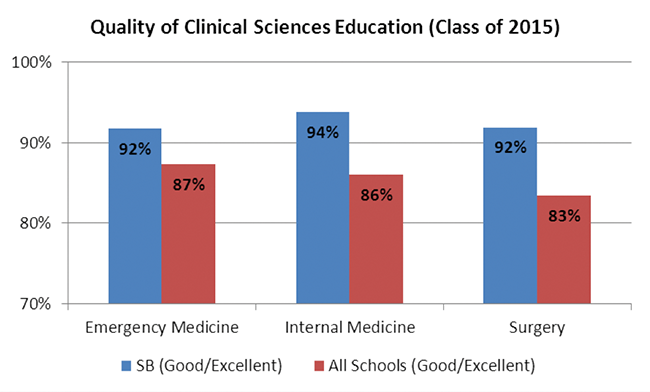
The two-week Communicating Science to the Public elective is a series of seminars and workshops for medical, nursing and dental students who want to communicate more effectively about health science with patients, the public, public officials, the media, etc. Directed by Evonne Kaplan-Liss, M.D., M.P.H., (evonne.kaplan-liss@stonybrook.edu) with guest lecturers from the Alan Alda Center for Communicating Science & Stony Brook School of Journalism. At the conclusion of this course, students will be able to speak clearly and vividly about science in ways a lay audience can understand and appreciate; connect with an audience, colleagues, patients, friends, or any partners in communicating in a spontaneous, direct, personal and responsive way; use communication techniques that incorporate cultural competency and health literacy concepts to reach and mobilize the community and key stakeholders on health-related issues. Tentative dates TBD. Please check your weekly TGIF emails for when the dates are announced. Please use a Drop/Add form and bring to Bonnie Chalson.
Global Health Medicine is a once-a-week elective taken by year 1 & 2 medical students (open to all medical students as an elective) during the fall semester; lectures will be held on Mondays from 5:30 – 7:00pm, beginning September 14, 2015 through October 26, 2015. This course provides an introduction to the field of global health medicine and challenges medical students to think about how a global perspective could enhance your future medical practice. The first half of the course will provide an introduction to some core concepts in global health medicine; how to measure the global burden of disease; recent progress and current challenges; social inequalities in health; health systems; and global stakeholders. The second half of the course will focus on major global health topics, including child health and immunization, infection disease epidemiology, chronic disease epidemiology and humanitarian efforts. NOTE: This elective is required for students enrolling in the Scholarly Concentration Global Health Track. Course Primary Contact: Dr. David Graham, MD, MPH at David.Graham@stonybrookmedicine.edu
The Rising Leaders in Health Care is a ten-week elective that runs from mid-September to mid-December. The core goals of this elective are to: Gain real-world, applicable skills; enhance professional networks; build community relationships; expand cultural awareness; evaluate healthcare industry efficiency and effectiveness; and ultimately improve the quality of patient care. Students are required to work in teams to develop a project that addresses any of the themes presented in the course. To register, please complete a Drop/Add form and submit the form to Bonnie Chalson. The primary course contact is Richard Iuli, PhD - Richard.iuli@stonybrookmedicine.edu.
This two-week elective will run from August 17-October 19. The first session will be on Monday August 17 from 3:30PM-5:00PM. To sign up, please use a drop/add form. You would take this while you are taking other coursework. This elective offers a series of seminars and workshops designed for students with an interest in teaching and academic medicine. This elective will provide an introduction to the fundamentals of adult learning and will allow students to apply and improve their teaching skills in a variety of settings. Students will be expected to create their own lesson plans using various resources and teaching methods. Students will rehearse their lectures with each other before presenting them, in order to gain experience with small group teaching and learn how to provide and adapt to feedback from peers. The course has reading requirements. Students are expected to be self-motivated and committed in their approach to this course. Please contact wei-hsin.lu@stonybrookmedicine.edu for any questions.
MD/PhD: Stony Brook University, in conjunction with Cold Spring Harbor Laboratory and Brookhaven National Laboratory, sponsors a medical scientist training program (MSTP) leading to both the MD and PhD degrees. The purpose of the MSTP, partially funded by a competitive grant from the National Institutes of Health, is to train academic medical scientists for both research and teaching in medical schools and research institutions. Graduates of this program are equipped to study major medical problems at the basic level, and at the same time, to recognize the clinical significance of their discoveries. You can find more information at this website: http://www.pharm.stonybrook.edu/mstp.
MD/MBA: For the MD/MBA, the students apply to Renaissance School of Medicine and indicate that they are interested in the MBA program. They are accepted to Renaissance School of Medicine first, followed by acceptance to the School of Business. The MBA is 48 credits consisting of 16 courses. Students can take most of the MBA before starting medical school or after completing their medical degree. Some students opt to take a year off from medical school to complete the bulk of their MBA courses. Ethics and Law, and an Industry Project offer credit in both the MD and MBA programs. You can find more information at this website: http://www.stonybrook.edu/commcms/business/mba/md_mba.html.
MD/MPH: The MPH Program advocates a population health approach to public health. The hallmarks of population health are an ecological understanding of the determinants of health and a systems approach to solving health problems; emphasis on proactively stabilizing and improving health among all populations; and insistence on accountability, evidence-based practice, and continuous performance improvement.” The program focuses on developing public health leaders who will make an impact on society. You can find more information at this website: http://publichealth.stonybrookmedicine.edu/academics/degreeoptions/grad/md.
MD/MA: The Center for Medical Humanities, Compassionate Care, and Bioethics offers, on a selective basis, the opportunity for up to 2 medical students a year to participate in our joint MD/MA program. In addition to their coursework, these students enroll in the MD with Scholarly Concentration program and take 18 credits from our MA program in Medical Humanities, Compassionate Care and Bioethics to receive a joint MD/MA upon graduation. Medical students wishing to enroll in this program should contact Michael Ortega (Michael.Ortega@stonybrookmedicine.edu) for details about how to apply. You can find more information at this website: http://www.stonybrook.edu/bioethics/medicaleducation.shtml.
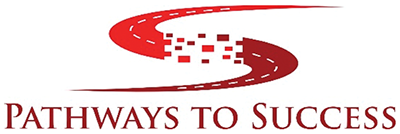
What does success in medical school look like? Earning Honors in coursework and clerkships? Holding a position of leadership in a student organization? Serving as a student representative on a school governance committee? Having deft motor skills required of a surgeon? Being viewed by preceptors and peers as a patient advocate? Being the quickest to work up a differential diagnosis? Being an integral contributor to an interprofessional health care team. An argument can be made for any or all of these as benchmarks of success. Ultimately, success in medical school is matching to a residency program in your chosen specialty.
We at Renaissance School of Medicine created Pathways to Success (P2S) to ensure that our medical students realize that ultimate success, but there are several pathways students must successfully navigate to reach that ultimate destination. These pathways include success in academics, teamwork and professionalism, and specialty selection and residency matching. The pathway to academic success, the pathway to becoming a collaborative team-oriented medical professional, and the pathway to evaluating and selecting a medical specialty to pursue. Let me share a little about how we support you along each pathway to success.
Advising Pods are designed to support and guide students through Phase 1 of the LEARN curriculum by providing small-group and individual academic advising; promoting teamwork, peer feedback, self-reflection and professionalism; and maintaining personal well-being. Each advising pod consists of 12-14 Phase 1A (first-year) students; 12-14 Phase 1B (second-year) students; 1 faculty Pod Advisor; and 2 Phase 3 (fourth-year) Peer Advisors. Pod sessions include all members of the pod and focus on general topics, e.g. balancing academics-family-life, and summer options and opportunities. One-on-one sessions between student-pod advisor and student-peer advisor focus on academic advising and planning, and peer and self-assessment review.
CAREERS (Counseling And Resources for Evaluating and Entering Residencies and Specialties) is designed to support and guide students through the processes of exploring, evaluating and applying to medical specialties and residencies by creating a longitudinal CAREERS “course” that runs throughout the LEARN curriculum; offering program events through existing curricular structures; and facilitating the transition of student advising from the faculty Pod Advisor to the Specialty Advisor. There are some 20-22 designated CAREERS Events across the three phases of LEARN.
Begun in 2014, the Peer and Self-Assessment (PSA) program is a student-led initiative aimed at developing students’ constructive feedback and communication, and encouraging continuous improvement of self-reflective practice skills. Students regularly assess their peers in team or group-based activities that are part of the curriculum, e.g. a mock history and physical in ICM, an anatomy dissection session, a course TBL. Students generally complete one peer feedback each month throughout Phase 1. They also complete a self-assessment bimonthly, then meet with their Pod Advisor or Peer Advisor to review peer feedback and self-reflections.
Our students are well represented on our School Committees. Feel free to talk to your committee representatives to find out what’s going on regarding policy, curriculum, and other important committees. See if you can participate and help!
Committee on Academic Professional Progress:
Stephen Doyle, Edward Amador, Jay Chudow
Honor Code:
Michael Motley, Michael Mintz, Jaclyn McKenna, Uzma Rahman, Danni Liang, Eric Roth, Naureen Osman, Leena Shah, Anke Ziegenbalg, Nick Schwartz, Debbie Lee, Ashwin Maalhotra
Curriculum Committee:
Brianna Morgan, Funmi Agunloye, George Taylor, Alex Gauger
Student Finance Committee:
David Novikov, Tyler Jones, Brent Penque, Karen Tsai, Young Jin Kim, John Mattimore
Community Service Committee:
Cortney Crespo, Tzvia Piknhasov, Swati Chandhoke, Alex Abadir, Meghana Anugu,
Sumaiya Iqbal, Tahsin Khan
IT Liaison:
David Elkin, Michael Petry, George Zhou
AIMS:
Ray Kelly, Nigel Wilkinson-Maitland, Jacob Mathai, Rhia Shah, Raja Pillai
![]()
| TGIF: Read your TGIF emails from the UME office every Friday. Get news, important scheduling information, research and elective opportunities, etc. | |
| Student Activities in 2015-16: | |
| Transition to Medical School | August 12-21 |
| Second Year Welcome Back | August 17 |
| White Coat Ceremony | August 23 |
| Scholarly Concentrations Info Session | December 1 |
| Asian Extravaganza | December 4 |
| Match Day | March 18 |
| Research Day-SCP presentations | April 27 |
| Class of 2016 Commencement | May 19 |
| Diaspora of Color | To be determined |
| Evening of Art | To be determined |
| Global Medicine Info Session | To be determined |
| Hispanic Heritage Event | To be determined |
| Pot Luck Dinner | To be determined |
| Also check the School’s Academic Calendar at: https://cbase.som.sunysb.edu/conet/calendar/stud_mainFrame.cfm?school=Medicine | |
B I Deaconess Med Ctr-MA
Bassett Medical Center-NY
Case Western Reserve U-OH
Childrens Hospital-LA-CA
Christus Spohn Mem Hosp-TX
Cleveland Clinic Foundation-OH
Columbia Univ Physicians & Surgeons - NY
Duke Univ Med Ctr-NC
Einstein/Jacobi Med Ctr-NY
Einstein/Montefiore Med Ctr-NY
Emory Univ SOM-GA
Harbor-UCLA Med Ctr-CA
Harvard Longwood Psych-MA
Hosp of the Univ of PA
Icahn SOM at Mount Sinai-NY
Icahn SOM Beth Israel-NY
Icahn SOM St Lukes-Roosevelt-NY
Johns Hopkins Hosp-MD
Lehigh Valley Hosp-PA
Loma Linda University-CA
Maimonides Medical Center-NY
Mayo School of Grad Med Educ-MN
Memorial Sloan-Kettering-NY
Mercy Catholic Med Ctr-PA
Mt Auburn Hospital-MA
Nassau University Med Ctr-NY
North Shore-LIJ Health Sys-NY
NY Methodist Hospital-NY
NYP Hosp-Columbia & Cornell-NY
NYP Hosp-Columbia Univ Med Ctr-NY
NYP Hosp-Weill Cornell Med Ctr-NY
NYU School Of Medicine
Rutgers-R W Johnson Medical School-NJ
St Josephs-Syracuse-NY
State Univ. of New York at Buffalo - NY
SUNY at Stony Brook - NY
SUNY HSC Brooklyn-NY
SUNY Upstate Med University
Temple Univ Hosp-PA
Texas Tech University
Thomas Jefferson Univ-PA
U Arizona Affiliated Hospitals
U Cincinnati Med Ctr-OH
U Colorado SOM-Denver
U Connecticut School of Medicine
U Florida COM-Shands Hosp
U Michigan Hospitals-Ann Arbor
U Nevada Affiliated Hospitals-Las Vegas
U South Florida COM-Tampa
U Southern California
U Texas HSC-San Antonio
U Texas Southwestern Med Sch-Dallas
U Wisconsin Hospital and Clinics
UC Davis Med Ctr-CA
UC Davis Med Ctr-CA
UC Irvine Med Ctr-CA
UC San Diego Med Ctr-CA
UCLA Medical Center-CA
University at Buffalo SOM-NY
UPMC Medical Education-PA
Winthrop-Univ Hosp-NY
Wright Patterson AFB-OH
Yale-Greenwich Hosp-CT
| Download PDF Version |


